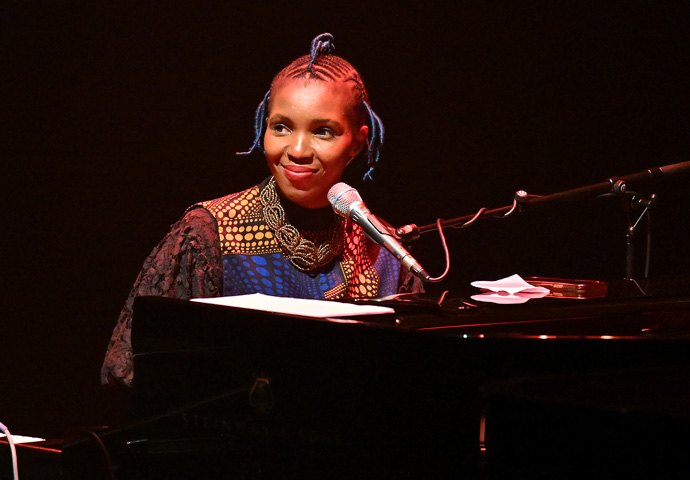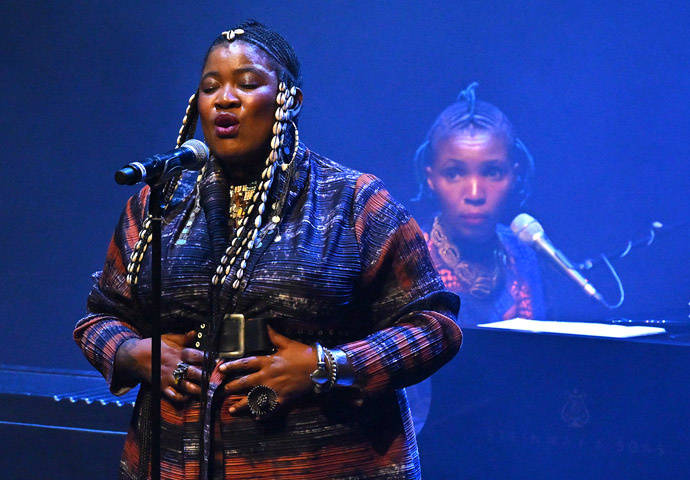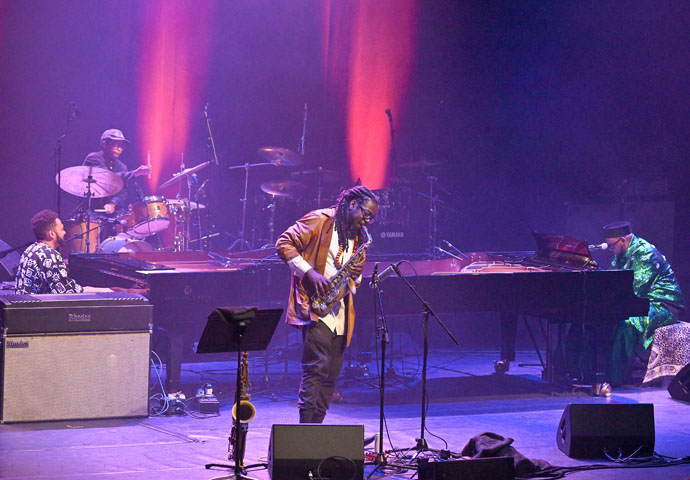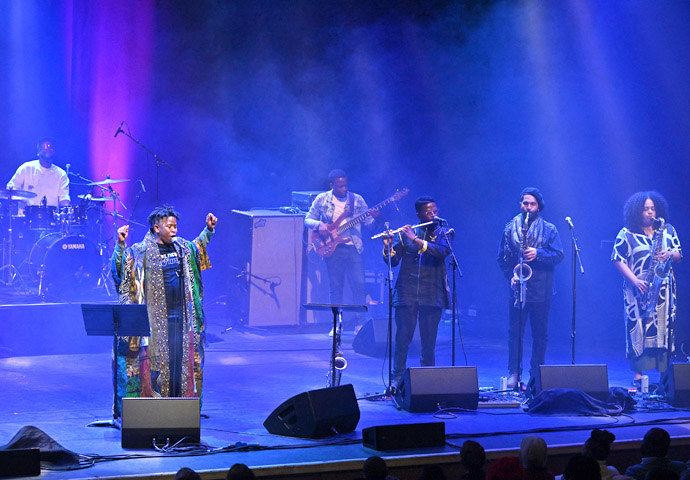EFG London Jazz Festival: Sikelela, 30 years on – A Celebration of South African jazz
Barbican November 24
Monday, 25th November 2024 — By Robert Ryan

Pianist-singer Thandi Ntuli [Mark Allan]
AS with so many repressive regimes, music was a form of protest in South Africa in the 1960s and 70s, especially jazz music, which the government regarded with suspicion.
Pianist Chris McGregor came under the Big Brother gaze when he formed the racially mixed Blue Notes in the early 60s, but in 1964, in face of official hostility, they decamped for Europe, where he formed Brotherhood of Breath, which as basically the Blue Notes plus sympathetic players drawn from the rich pool of London jazzers (Harry Becket, Alan Skidmore, John Surman etc).
I cannot remember the full line-up when I caught the band at a sparsely attended concert in East London something like five decades ago. But Chris was on piano, Mongezi Feza played pocket trumpet, Dudu Pukwana was on alto, Harry Miller held down the bass with Louis Moholo on drums. All are gone now, apart from Louis Moholo (who has since added an extra Moholo to his name) and all much missed (there was a time when it seemed every gig I went to had Harry on bass).
The audience might have been meagre, but BoB’s sound was both mighty and joyous. They played like there were 600 people in the audience, not six. It was raw, unpolished in places, but it was as if Sun Ra had been born in District Six and McGregor’s crashing, rippling keyboard sounds suggested a pan-African Duke Ellington or Mingus. It was exhilarating beyond belief, and it was one of handful of concerts that cemented my love of jazz in all its forms.
South African jazz remains healthy and vibrant and on the last night of the EFG London Jazz festival I went to a rather better attended concert at the Barbican called Sikelela (“Blessing”, a word used in the S.A. national anthem), marking 30 years of democracy in the country.
It had been a very busy, successful 10 days for the festival – the Jazz Social “hub” for events, intimate shows and buying Blue Note vinyl and merch was well received and will doubtless return, and there were first-rate shows by Pat Metheny (a real highlight), Billy Cobham (his 80th celebration), the raucous and roaring Village of the Sun at Lafayette (basically an expanded version of Binker & Moses), a manically entertaining Jamie Cullum, Tony Kofi’s big band playing the music of Charles Tolliver (the latter didn’t contribute as much I had hoped, but he is 82) and more.
Of course, there were gaps, as I simply couldn’t get to everything – no Chris Potter and Dave Holland or Ganavya – and on the last night I had to choose between a Coltrane tribute with the BBC Concert Orchestra and a South African evening. With Brotherhood of Breath in mind, I opted for the latter.

Thandiswa Mazwai and Thandi Ntuli, right [Mark Allan]
The show was split into three “acts”. First up was pianist-singer Thandi Ntuli, who brought to mind a young Nina Simone, impassioned, even angry, and with a fabulous, rolling percussive sound that recalled Abdullah Ibrahim back when he was called Dollar Brand and the solo piano recordings of the late, great Bheki Mseleku (listen to his posthumously released Beyond the Stars).
She played and sang Rainbow Revisited from her highly recommended International Anthem album of the same name she did with percussionist/producer Carlos Niño and it was divine.
She was soon joined by singer Thandiswa Mazwai, a political protégé of trumpet giant and activist Hugh Masekela, whose powerful, heartfelt vocals filled every square inch of the hall.
It was noticeable, though, that this celebration had a bitter-sweet undertow – the performers were only too aware that the three decades has not delivered the South Africa many dreamed of, or the one the country deserves. As Thandi Ntuli says: “Thirty years and a lot of the promises have not been kept.”

Bokani Dyer, Tumi Mogorosi, Soweto Kinch, Keenan Mayer [Mark Allan]
The second act consisted of pianists Bokani Dyer and Keenan Myer plus drummer Tumi Magorosi and, as special guest, our own Soweto Kinch, a quartet of seasoned pros with their own well established projects. Playing compositions by each of them, it was Soweto who soared, once he ditched the EWI (Electronic Wind Instrument – I’m not a fan) and produced muscular solos on both alto and tenor. There was also much beauty in evidence although the fact that the finale veered into a tune that threatened to echo an East End pub singalong was a surprise, but there were powerful moments from all the players.

The Brother Moves On [Mark Allan]
After the interval the evening’s curator Siyabonga Mthembu appeared in resplendent robes, alongside a modified version of his Brother Moves On ensemble, and, after some vocal exhortations from the band, ushered in a sombre and affecting section that was an extended prayer for peace, before upping the energy level (with Chelsea Carmichael, who has been in South Africa recently, on tenor doing some fine work) and letting the people – some of them anyway – dance.
It might not have been the rumbustious township jazz I was half expecting but it gave a more rounded vision of South Africa’s long and ongoing journey than a night of pure party music would, and Siyabonga Mthembu and company managed to send us out into a wet and stormy night with hope and optimism in our hearts. A blessing indeed.
Well done to organisers/promoters Serious and the 60-odd venues that brought the EFG London Jazz festival together.
Here’s to 2025 – this time I’ll have a spreadsheet at the ready.